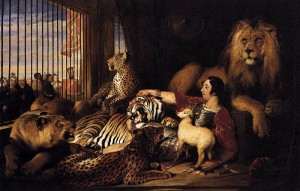We talk about creation, about “caring” for the earth, for the sake of future generations, or about “abusing” it. How do we think about these things? We stand at a great divide: Either the cosmos was deliberately created as a willed order or it was always there. It just happened along.
Biblical information about creation tells us that it is “good,” that it fits together, that it bespeaks the glory of God. It is not itself a “god,” nor is God part of it. The cosmos was made for man, not the other way around. Each human individual has a purpose that transcends the cosmos itself and connects him with its origin.
The main concern is with the final destiny of each member of the human species. Each person is judged for what he freely did during his allotted lifetime – whenever, wherever, or whatever it was, great or small.
Included in creation are its natural riches, plus human brains and hands. The abundance of creation was evidently provided so that, through it, human beings could achieve their purpose. Man’s intelligence gave him “dominion” over other creatures and goods, found already present in this creation. Their perfection is related to his.
Man is a late-arriving creature within the cosmos. He has fairly rapidly expanded his planetary numbers to something over seven billion. The reason he could sustain these numbers was because he learned how to harness the good things, already found there, for his needs on this earth.
Even a century ago, we had little idea about how richly this planet was endowed. Population increases are looked upon either as threats or as blessings. Some maintain that we are rapidly running out of resources. We must reduce and control our numbers to last down the ages. Others maintain that we can provide for ourselves if we will. What we are given, what we are, and what is our purpose – these issues are related to each other.
Behind these diverse assumptions looms the question of what the earth is for, in light of what human beings are for. We hear much talk, for example, that our natural resources are running out. We are implored to look to the needs of future generations. We selfishly “over-use” the gifts of creation. Our sins are now committed not against each other, but against the earth. We need to rewrite the Ten Commandments that are only concerned about man and God.

The old Marxists, good Epicureans that they were, used to complain that concern with supernatural life was an impediment to our concentrating on this life. The energy devoted to useless things like worship and doctrine, they thought, was better spent working at something useful. With everyone diligently laboring, we could produce a really good earth.
In one of his most devastating passages, Dostoyevsky said that, in the end, men would only ask for bread. That is, baking bread and such practical things would become man’s only purpose within the world. Once that choice is made, our worldly task will be to keep ourselves, or at least some yet-to-be-born folks not us, going for as long as possible in the future.
Things like globalization, ecology, international government, and population control thus become objects of intense political concern. Mankind’s task becomes one of figuring out, on the basis of what we now know, what we can plan for in the distant future. We have the option of keeping a few people alive for a large number of millennia or causing the deaths of millions by using things on a short-term basis. Logically, there is not much difference between these views. It’s just a question of how many and when.
Looking back at “creation,” we can wonder how shortsighted the Lord was in creating us. Was it conceivable that the purpose of creation was to keep alive on this planet a certain number of our kind for as long as it kept whirling in space? Or was this “death” thing asking us to look in another direction?
Revelation suggests that mankind, like each member of the species, has an inner-worldly end. The earth is endowed with enough resources that man, by his own development of them, could meet the needs he has for a good life. To plan merely to go on and on is a kind of hubris that shifts attention away from what man is asked principally to do with his life, namely, save his soul.
This “saving one’s soul” is a red flag for many who are committed to a save-the-earth-first philosophy, a view that subordinates man to cosmic and human forces, not vice versa.
Briefly, Christ came to save us from our sins, not to keep us floundering around forever in this world. What we will to do or not to do is what makes us closer, or more distant, from God in whatever age, since the beginning, in which we live.














